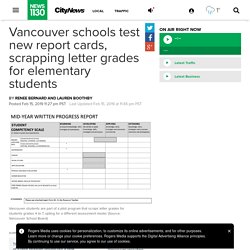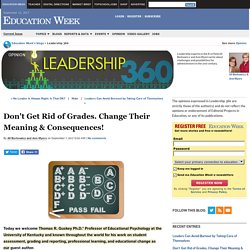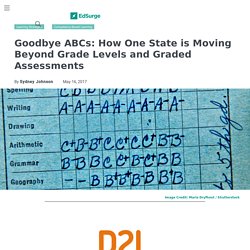

Interesting quote. #grading #edchat Thoughts?… 12 Alternatives To Letter Grades In Education. 12 Alternatives To Letter Grades In Education by Terry Heick Few artifacts of formal learning are as iconic as the letter grade.

What can I do to get an A? She’s a C student. He’s always gotten As and Bs in all of his classes. Then we turn the letters into numbers–letter grades become averages of letter grades, which, when calculated, determined whether or not a learner qualifies to play sports, get into college, or thinks of him or herself as “smart.” She has a 4.0 GPA. You’re not getting into Stanford with that GPA. It is an incredibly powerful symbol that isn’t going to be erased by long-winded rhetoric. The issue is, in all honesty, they probably don’t. Could You Teach Without Grades? Vancouver schools test new report cards, scrapping letter grades for elementary students. VANCOUVER (NEWS 1130) — Letter grades on B.C. elementary school report cards will soon be obsolete.

Students in Vancouver are part of pilot project, which is paving the way for changes in how kids get assessed in school. The new system is getting away from quantifying the amount of content learned, and assigning letter grades to reflect the level of achievement. Typically, letter grades were used in Grades 4 to 7. Two-thirds of Vancouver’s 90 elementary schools and a number of secondary schools are taking part in the pilot project which started last year.
The province launched its own pilot project, involving 14 school districts. RELATED: Vancouver recruiters head east to find teachers willing to work in expensive housing market. Exploring Ways to Say So Long to Traditional Letter Grades. High school junior Jadyn Sullivan tends to get stressed about schoolwork.

Like many of her peers, she worries about her grades. But in her physics class, there is no traditional A-F grading scale to worry about. That's because David Frangiosa, Jadyn's teacher at Pascack Hills High School in Montvale, N.J., uses standards-based grading instead. In that system, students don't get grades on their assignments. Instead, Frangiosa gives them detailed feedback, and their performance is measured against specific course standards for mastery of the content. Jadyn will only see a reported grade twice during the year: a midyear progress report and the final grade on her report card, which is based on a month-long final project. "I feel like I'm learning a lot more than I would" if there was a grade attached to each assignment, she said.
Jadyn's experience is not the norm in schools, but it's part of a growing trend of educators rethinking grading. What Straight-A Students Get Wrong. Will Letter Grades Survive? Under pressure from an unprecedented constellation of forces—from state lawmakers to prestigious private schools and college admissions offices—the ubiquitous one-page high school transcript lined with A–F letter grades may soon be a relic of the past. In the last decade, at least 15 state legislatures and boards of education have adopted policies incentivizing their public schools to prioritize measures other than grades when assessing students’ skills and competencies. And more recently, over 150 of the top private high schools in the U.S., including Phillips Exeter and Dalton—storied institutions which have long relied on the status conveyed by student ranking—have pledged to shift to new transcripts that provide more comprehensive, qualitative feedback on students while ruling out any mention of credit hours, GPAs, or A–F grades.
Picking Up Steam Scott Looney, head of the Hawken School in Cleveland, was frustrated. The purpose of education is not to sort kids—it’s to grow kids. A Letter Grade Isn’t A Letter Grade: Why We Should Stop Averaging Scores - A Letter Grade Isn’t A Letter Grade: Why We Should Stop Averaging Scores by Terry Heick Quick preface: Any argument rests on premises and terms, and so clarifying those premises and terms and related underlying assumptions is necessary if that argument is to be entirely understood.

This makes itemized and clearly linear delineations of an argument both useful and easy to follow, and from time to time I’ve found them useful myself to clarify my own thinking—its sources, flaws, and related ideas that suggest further thinking and analysis. How Accurate Are Your Grades? Ep. 94 Why I Don't Grade - TeachThought PD. Drew Perkins talks with Jesse Stommel, Executive Director of the Division of Teaching and Learning Technologies at University of Mary Washington about grading (or not grading), assessment and the relationship to teaching and learning.

Links & Resources Mentioned In This Episode: *Also published at TeachThought.com Subscribe. Education Week. Today we welcome Thomas R.

Guskey Ph.D.* Professor of Educational Psychology at the University of Kentucky and known throughout the world for his work on student assessment, grading and reporting, professional learning, and educational change as our guest author. Newspapers, magazines, and journals today are filled with articles about the evils of grades. Writers tell us that grades warp student motivation, destroy the morale of teachers, and corrupt the education process. Do No Harm: Flexible and Smart Grading Practices. My Edutopia post When Grading Harms Student Learning generated a lot of buzz.

Grading is an emotional subject, with strong-held opinions and ideas. I was really excited to see discussion on all sides of the issue. The best feedback for me was that, while many readers agreed with parts of the premise, I hadn't been specific on support strategies. Thank you for that feedback -- it was specific, actionable, and created the need and excitement for a follow-up post. While there are many tools out there that help address concerns around redoes, zeroes, not grading homework, and more, here are some of my favorites: Address Behavioral Issues Affecting Academic Achievement Points off for late work may not motivate students. Ww2.kqed. Edutopia. Goodbye ABCs: How One State is Moving Beyond Grade Levels and Graded Assessments. The term “grades” has become almost taboo among some educators in New Hampshire, where seven elementary schools are slowly ditching the word altogether through a program known as NG2.

The program—short for “no grades, no grades”—is hallmarked by the schools shifting to a more competency-based assessment structure and removal of grade levels. Mary Earick, project director for NG2, says the purpose of the program is to create more flexible learning pathways for students through “competency-based multiage schooling,” which allows students to move on to new objectives only after mastering others.
“[NG2] tackles long-standing educational barriers to personalized learning . . . that of 'Grades,'” Earick writes in an upcoming report on the project. Those barriers include “(1) student assessments that don't accurately reflect students’ true understandings and skills and (2) methods for grouping students (by age) that often poorly align to their true needs as learners.”